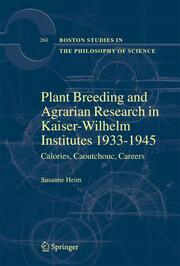Detailansicht
Calories, Caoutchouc, Careers
Plant Breeding and Agrarian Research in Kaiser-Wilhelm-Institutes 1933-1945 - Boston Studies in the Philosophy of Science 260, Boston Studies in the Philosophy and History of Science 260
ISBN/EAN: 9781402067174
Umbreit-Nr.: 1064837
Sprache:
Englisch
Umfang: x, 235 S.
Format in cm:
Einband:
gebundenes Buch
Erschienen am 24.04.2008
Auflage: 1/2008
- Zusatztext
- InhaltsangabeIntroduction: Politics and Agricultural Research Calories Agricultural Research, the Food Economy and War Herbert Backe and Science Policy Research on Plant and Animal Breeding Foreign Currencies, Genetics and the Fodder Gap Autochthonous Animal Species and Artificial Insemination The FourYear Plan, 'Greater Europe', and Substitute Substances Hydrobiology and Limnology for the Four-Year Plan Institute Projects in South-Eastern Europe Research on Native Textile Plants Productivization of People The Science of Agricultural Work Work Physiology and Nutritional Science Résumé: War as Opportunity Caoutchouc A Vital War Reserve The Development of a Research Programme Dependence on Natural Rubber The KokSagyz Network Slave Labour for Science KokSagyz Cultivation in GermanOccupied Europe Plant Breeding Research in Auschwitz Résumé: Scientific Productivity and Terror Careers Hans Stubbe and Klaus von Rosenstiel Two Breeding Researchers The Pure Air of Scientific Research The Seamy Side of Academic Life The Advance of Science Wild Plants as a Genetic Resource Research Organisation in the Occupied East PostWar Careers Résumé: Creators, Experts, Servants Conclusions: Science, Nazi Rule and War
- Kurztext
- The book offers a history of the agricultural sciences in Nazi Germany. It analyzes scientific practice under the Nazi regime, Nazi agricultural policy and autarkic strategies as well as expansion policy in Eastern Europe. It also offers new insights into the Auschwitz concentration camp. It outlines the Nazi's comprehensive nutritional and agricultural research program intended to prepare Germany for war by raising productivity through scientific means, researching the relation between nutrition and performance at the edge of starvation, and restructuring the agricultural economy of the continent. The book reveals the relation between science and power in Nazi Germany beyond the usual dichotomy that paints scientists in Nazi Germany either as victims of oppression or as sadistic beasts. It shows the involvement of a high ranking scientific elite in the Nazi regime of occupation and looting of cultural goods in the occupied eastern territories - largely for the sake of their own careers. The main audience the book addresses are students of history and the history of science, and anyone interested in the history of Nazi Germany.
- Autorenportrait
- InhaltsangabeIntroduction: Politics and Agricultural Research Calories Agricultural Research, the Food Economy and War Herbert Backe and Science Policy Research on Plant and Animal Breeding Foreign Currencies, Genetics and the Fodder Gap Autochthonous Animal Species and Artificial Insemination The FourYear Plan, 'Greater Europe', and Substitute Substances Hydrobiology and Limnology for the Four-Year Plan Institute Projects in South-Eastern Europe Research on Native Textile Plants Productivization of People The Science of Agricultural Work Work Physiology and Nutritional Science Résumé: War as Opportunity Caoutchouc A Vital War Reserve The Development of a Research Programme Dependence on Natural Rubber The KokSagyz Network Slave Labour for Science KokSagyz Cultivation in GermanOccupied Europe Plant Breeding Research in Auschwitz Résumé: Scientific Productivity and Terror Careers Hans Stubbe and Klaus von Rosenstiel Two Breeding Researchers The Pure Air of Scientific Research The Seamy Side of Academic Life The Advance of Science Wild Plants as a Genetic Resource Research Organisation in the Occupied East PostWar Careers Résumé: Creators, Experts, Servants Conclusions: Science, Nazi Rule and War
